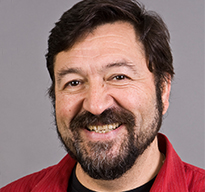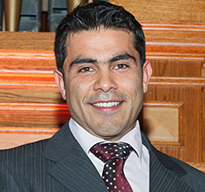Formation Damage During Waterflood, PWRI and CO2 Storage
Disciplines: Production and Operations | Reservoir
Course Description
Currently, about 65% of worldwide oil is produced by waterflooding, produced water re-injection (PWRI), and production with strong water support. Yet, formation damage is a serious obstacle for oil- and gasfield development as well as subsurface CO2 storage. Intensive well and fluid management are necessary to prevent decline in well injectivity and productivity. This is the focus of the training course. We cover the major cases of formation damage, the corresponding reservoir physics, laboratory studies and mathematical modelling, and well behaviour prediction leading the optimal well and fluid management strategies.
The course includes numerous waterflood and CO2 storage cases from North Sea, Campos Basin, Gulf of Mexico and Volgo-Ural region. Numerous training exercises cover well behaviour forecast, skin factor predictions and laboratory and field data interpretation. The unique feature of the course are formation-damage assisted technologies, where the deliberately induced migration of injected or reservoir fines decreases water production, causes flux diversion and enhances the reservoir sweep.
Daily Activities and Technical Agenda (pdf)
Learning Level
Intermediate and advanced
Course Length
2 Days
Why Attend
The main objectives of the course are the development of engineering skills in formation damage, its prediction, prevention, mitigation and removal. After the course, the participant is unable to diagnose possible or existing causes and physics mechanisms of formation damage, identify the technological methods of its prevention, mitigation and removal, and formulate necessary laboratory tests and mathematical modelling. Due to a unified approach to major formation damage processes, developed during 40-year industrial experience, the authors manage to describe almost all main causes for productivity and injectivity decline during water and CO2 injection. The course shows how the developed formation-damage skills are applied in well drilling, completion, fracturing, acidizing, and CO2 injection.
Who Attends
The course is aimed at production, drilling and reservoir engineers, simulation and laboratory specialists involved in waterflooding, PWRI, well stimulation, EOR and CO2 storage projects. The course is designed for medium- and high-experience specialists as well as for young graduated engineers, MSc and PhD students.
CEUs
Engineers are responsible for enhancing their professional competence throughout their careers. Licensed, chartered, and/or certified engineers are sometimes required by government entities to provide proof of continued professional development and training. Training credits are defined as Continuing Education Units (CEUs) or Professional Development Hours (PDH).
Attendees of SPE training courses earn 0.8 CEUs for each day of training. We provide each attendee a certificate upon completion of the training course.
Additional Resources
This course has supplemental books located in our SPE Bookstore entitled Waterflooding and The Reservoir Engineering Aspects of Waterflooding, Second Edition. Please check out these valuable resources!
Cancellation Policy
All cancellations must be received no later than 14 days prior to the course start date. Cancellations made after the 14-day window will not be refunded. Refunds will not be given due to no show situations.
Training sessions attached to SPE conferences and workshops follow the cancellation policies stated on the event information page. Please check that page for specific cancellation information.
SPE reserves the right to cancel or re-schedule courses at will. Notification of changes will be made as quickly as possible; please keep this in mind when arranging travel, as SPE is not responsible for any fees charged for cancelling or changing travel arrangements.
We reserve the right to substitute course instructors as necessary.
Instructors

Pavel Bedrikovetsky is an author of a seminal book in reservoir engineering and 260+ technical papers in international journals and SPE. His research covers formation damage, unconventional resources, waterflooding, EOR and CO2 storage. He holds MSc in Applied Mathematics, PhD in Fluid Mechanics and DSc in Reservoir Engineering from Moscow Oil-Gas Gubkin University. In 1991-1994 he was a Visiting Professor at Delft University of Technology and at Imperial College of Science and Technology. From 1994 and until now Pavel is a Petrobras Staff Consultant. He boasts 40-year industrial experience in Russia, Europe, Brazil and Australia. Currently he holds Chair in Petroleum Engineering at Australian School of Petroleum at the University of Adelaide. He served as Section Chairman, short course instructor, key speaker and Steering Committee member at many SPE Conferences. He was also the 2008-2009 and 2016-2017 SPE Distinguished Lecturer and SPE Distinguished member.

Abbas Zeinijahromi is Senior Lecturer in Petroleum Engineering at the University of Adelaide. He hold a BEng degree in Production Engineering, a MSc degree in Reservoir Engineering and a PhD degree in Petroleum Engineering. He has been teaching petroleum engineering courses for over 10 years, particularly "Data analytics in oil and gas industry" at the Australian School of Petroleum and Energy Resources (ASPER). Dr Zeinijahromi has over 80 publications. His current work is focused on "multi-phase flow in porous media" with application in "CO2 Storage (CCUS)", "Low Salinity Waterflooding", "Formation Damage", and "EOR".
Other courses by these instructors
Mohammad Sayyafzadeh
Abbas Zeinijahromi
This course introduces the theory and fundamentals of machine learning and data analytics techniques. This is a hands-on course and participants will apply data analytics and machine learning methods using real field examples. The course covers the fol...
(Read More)Disciplines: Data Science and Engineering Analytics | Reservoir
